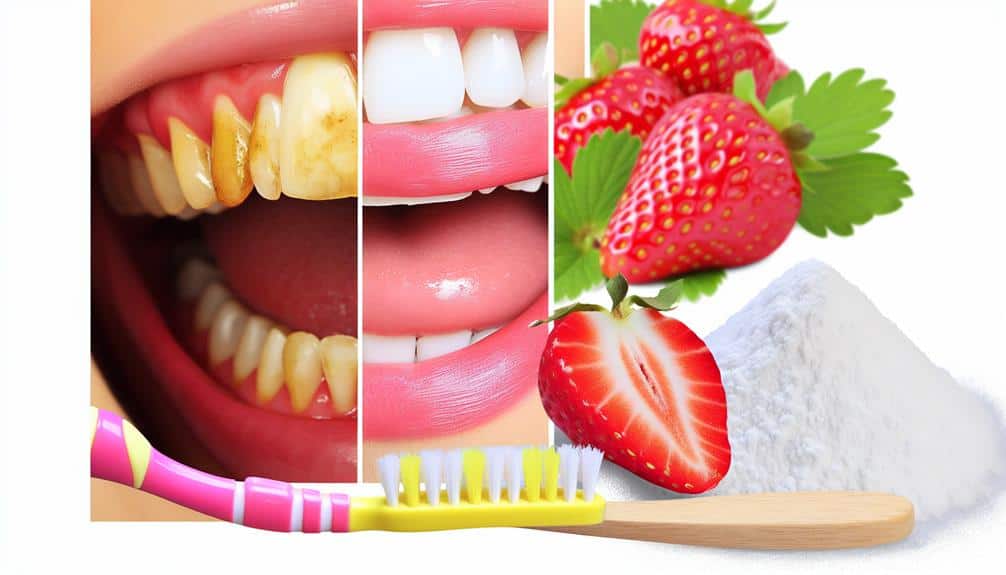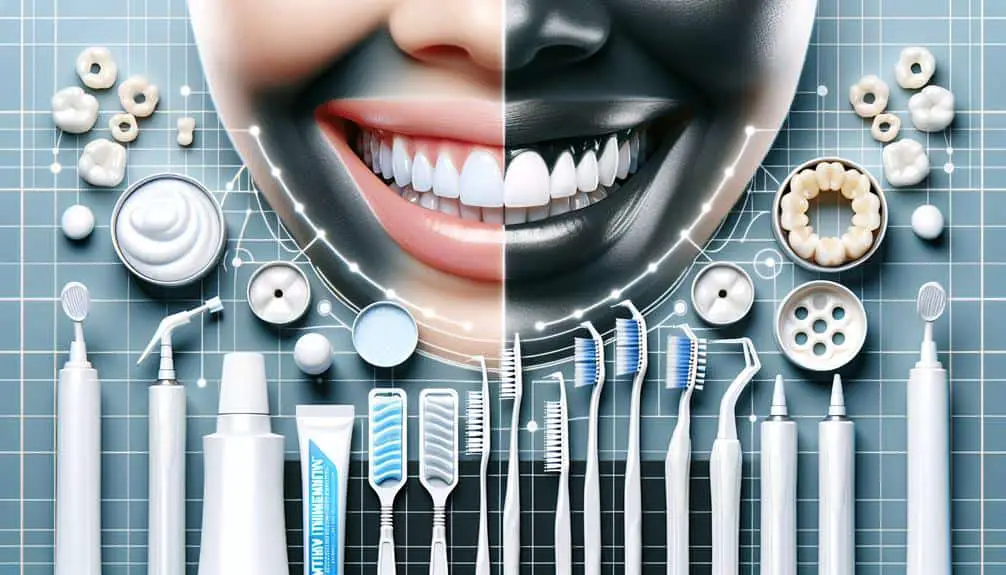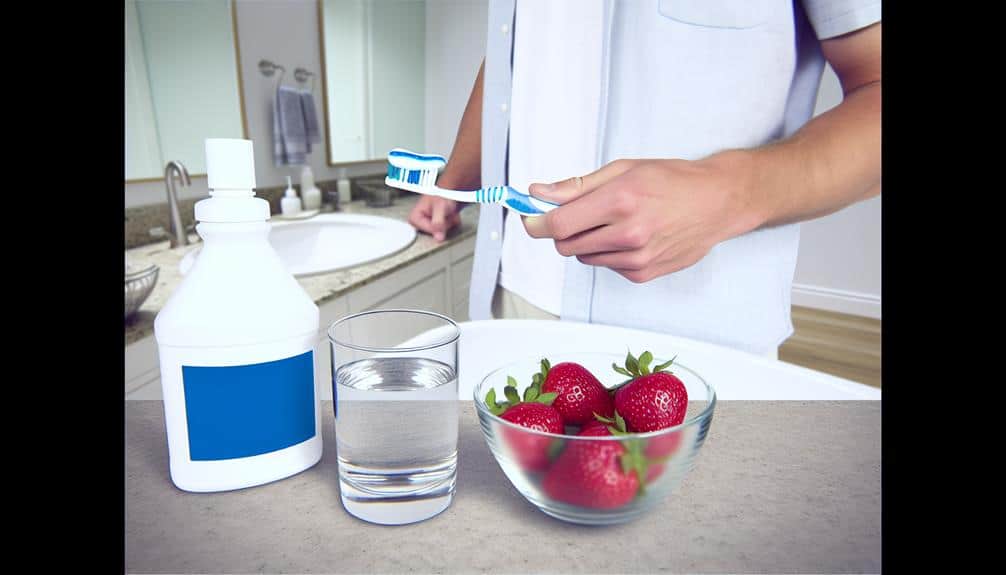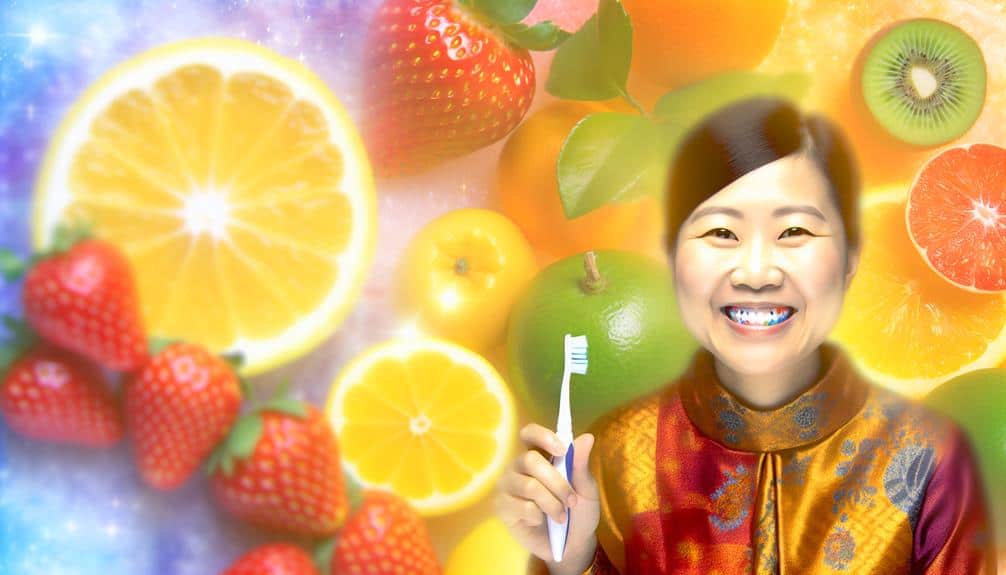To effectively remove tooth stains, start by seeking professional teeth whitening procedures that offer quick results with high-concentration whitening agents. Consult your dentist for customized options like laser treatments or whitening trays. Incorporate whitening toothpaste into your routine to maintain results. Consistent oral hygiene, including brushing twice daily with fluoride toothpaste and daily flossing, is essential. By limiting staining foods and beverages, you can prevent new stains from forming. These tips will help you achieve a brighter smile and maintain peak oral health.
Key Points
- Professional teeth whitening for quick and effective results.
- Consistent use of whitening toothpaste to maintain brightness.
- Avoid tobacco and limit staining foods and drinks.
- Regular dental check-ups every six months for oral health.
- Proper oral hygiene with brushing and flossing daily.
Understanding Tooth Stains
To effectively tackle tooth stains, it's important to understand the various causes and types of discoloration that can affect your teeth. Causes of tooth stains can be extrinsic, such as from foods like coffee, tea, or red wine that can penetrate the enamel, or intrinsic, which are stains that occur within the tooth, often due to aging or certain medications. Prevention is key to maintaining a bright smile. Proper oral hygiene, including regular brushing and flossing, can help prevent surface stains. Avoiding tobacco products and limiting foods and drinks known to cause staining can also aid in prevention.
Understanding the causes of tooth stains empowers you to make informed decisions about your oral care routine. By being proactive in preventing stains, you can reduce the need for more aggressive whitening treatments in the future. Remember, consistency in your oral hygiene practices and lifestyle choices plays a significant role in keeping your smile bright and free from discoloration.
Effective Whitening Techniques
For effective whitening techniques that can help brighten your smile, contemplate incorporating professional dental treatments alongside at-home remedies for best results. When it comes to achieving a whiter smile, combining different approaches can lead to ideal outcomes. Here are some strategies to ponder:
- Professional Treatments:
- Professional teeth whitening procedures performed at your dentist's office can provide quick and noticeable results.
- Dental professionals use specialized techniques and high-concentration whitening agents to target stubborn stains effectively.
- Consult with your dentist to explore options like laser whitening or custom trays for personalized treatment.
- At-Home Remedies:
- Whitening toothpaste can help maintain the results of professional treatments and remove surface stains.
- Over-the-counter whitening strips or gels offer convenience and gradual whitening effects when used as directed.
- Natural remedies like baking soda or activated charcoal may provide mild whitening benefits, but their effectiveness varies.
Maintaining a Bright Smile
Maintain a bright smile by implementing a consistent oral hygiene routine that includes brushing, flossing, and regular dental check-ups. Essential habits play an important role in keeping your smile radiant. Brush your teeth at least twice a day using a fluoride toothpaste to remove plaque and prevent staining. Don't forget to floss daily to clean between your teeth and along the gumline, where your toothbrush may not reach. Additionally, schedule regular dental check-ups every six months for professional cleanings and to address any potential issues early on.
In addition to your oral hygiene routine, dietary choices can impact the brightness of your smile. Limit the consumption of staining foods and beverages such as coffee, tea, red wine, and berries. When you do indulge in these items, consider using a straw to minimize contact with your teeth. Rinse your mouth with water after eating or drinking stain-causing substances to help reduce their effects on your teeth. By combining good preventive habits with mindful dietary choices, you can maintain a bright smile and prevent future tooth stains.
Frequently Asked Questions
Are There Any Natural Remedies or DIY Techniques That Can Effectively Remove Tooth Stains?
You want pearly whites, right? Try natural remedies like baking soda or DIY techniques like oil pulling. They work wonders. Results speak for themselves. Your dazzling smile will thank you later.
Can Certain Lifestyle Habits, Such as Smoking or Drinking Coffee, Contribute to Tooth Stains Even After Whitening Treatments?
Maintaining good oral hygiene is vital. Lifestyle habits like smoking or drinking coffee can contribute to tooth stains, even after whitening treatments. Professional dental cleanings and at-home remedies can help combat these effects for a brighter smile.
Are There Any Specific Foods or Drinks That Should Be Avoided to Prevent Tooth Stains From Reoccurring?
To prevent tooth stains from reoccurring, consider dietary restrictions. Avoid acidic foods like citrus fruits and drinks such as coffee and red wine. Implement preventive measures like rinsing with water after consuming stain-causing items. Consistent oral hygiene is key.
Is There a Correlation Between Age and Tooth Stains, and Are Older Individuals More Prone to Developing Stubborn Stains?
As you age, your brushing habits play a vital role in preventing stubborn stains. Genetics and enamel health also affect stain susceptibility. Remember, older individuals aren't necessarily doomed to stains, but diligence in oral care is key.
Can Genetics Play a Role in the Development of Tooth Stains, and Are Some Individuals More Genetically Predisposed to Staining Than Others?
Genetic predisposition can indeed influence tooth stains. Family history often indicates staining susceptibility. Some individuals may be more genetically predisposed to tooth discoloration, making them prone to developing stubborn stains despite diligent oral care routines.



